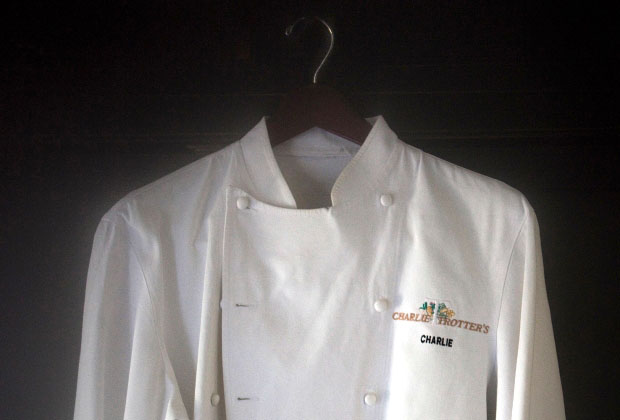Charlie Trotter—Chicago’s most famous, revered, groundbreaking, and feared chef—has died at 54. Multiple sources report that he was found unconscious this morning in his Lincoln Park home by his son, Dylan, and died soon after at Northwestern Memorial Hospital. It’s difficult to imagine the horrors his family is going through right now, and no amount of sympathy can possibly help.
We could rehash the usual stories about Trotter’s tantrums and talents, people he humiliated, or awards he won at his eponymous restaurant. But in the end, what we have here is a tragic story about an unconventional man.
The obvious whispers at the moment—suicide? drugs?—sound horribly crass, but we’ve been conditioned to imagine the worst when a heretofore healthy celebrity is discovered unresponsive in his home. Especially when the star in question’s only recent newsworthiness has revolved around the bizarre and distressing contretemps of a seemingly unstable individual.
The angels in us mourn the passing of a supremely gifted chef.
But no matter how hard we try to quash them, the devils in us, ever desirous of a juicy story, play out a relentless theoretical narrative of Trotter’s life that goes something like this:
Eccentric, creative North Shore kid starts cooking, realizes he’s a natural.
Kid unleashes his imagination and fearlessly follows his muse—an exacting, curious voice that leads him everywhere, takes him to the top of the field, and makes him world-famous.
At some point he gets so good, the muse starts following him.
Everyone else starts following him.
Few of those followers share his drive, his talent, or his personality, and he punishes them for their shortcomings.
Those who share his drive and talent get punished too, because they represent the greatest threat to his crown.
The world doesn’t understand his genius but accepts it. His meteoric success protects him from the harsh judgment of the public, much of which is willing to overlook his behavior as the by-product of a formidable perfectionist.
The world changes.
His students change with it. Many surpass him. Not necessarily in technique or exactitude, but in capturing the spirit of food that speaks to diners.
His exactitude hardens into bitterness. He lashes out, publicly and privately.
No longer the king, he finds a world that has turned against him. His name, once synonymous with brilliance, now represents the stubborn intolerance of a dinosaur that didn’t realize he was extinct.
He realizes the 25th anniversary of his eponymous restaurant represents the perfect cover to shutter it and walk away, pride intact.
In the following year, run-ins with auctioneers, reporters, and students strip raw his eccentricity, which may have been something else—something far darker—all along.
The outbursts are no longer perceived as the price of genius, but rather the frustrations of a bitter man who cannot handle a life outside the spotlight.
He dies on a Tuesday morning and trends on Twitter all afternoon. Everyone, from his dedicated protégés to those who publicly badmouthed him, now lament his passing, while whispering to one another about cause of death.
My last meal at Charlie Trotter’s was an odd experience. He had recently announced that the restaurant was closing and the food and mood were looser than they had been in years.
Trotter himself was frenzied, popping up all over the room to crack jokes and photobomb group pictures. Everyone around me seemed to be having a great time. This was unusual; the room’s vibe over the years—for diners and staffers alike—was more one of hushed reverence than exuberance. I remarked to my wife that it was the first time I had seen Trotter in a good mood, assuming that he was no longer feeling the impossible weight of competition and was enjoying a life that was finally something like the rest of ours. I realize now I had no idea what was going through his head.
True or not, Charlie Trotter’s story has the kind of arc that people love to call Shakespearean. Partially because most of us live quiet, normal lives and don’t know what else to call it when others triumph and suffer at levels far beyond anything we understand.
More details will come out in the following weeks, and perhaps we will learn that Trotter’s death is not shadowy, but rather a simple cardiac arrest following years of working harder than any human should. But it’s much more Shakespearean to imagine that the same mysterious edge that made Charlie Trotter a genius also ended up killing him.



